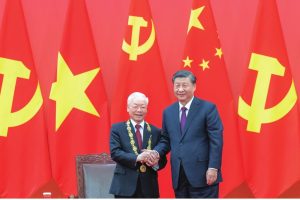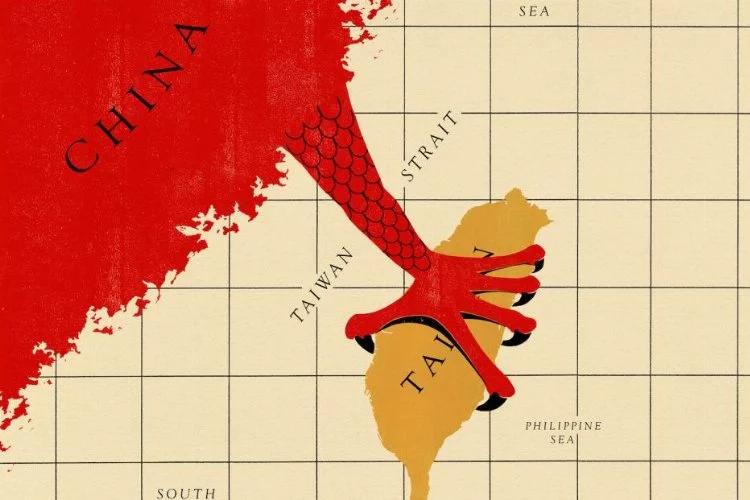
The China-Taiwan issue is still alive due to the fact that China claims Taiwan after the Chinese Civil War, and it is extremely curious how to proceed in the future.
October 31 , 2023

After the surrender of Japan in World War II, the occupation attempts that had been going on in Asia for many years came to an end. However, despite the end of the invasion attempts, the problems in the region have not ended. After the Japanese occupation, the nationalist party and the communist party confronted each other in mainland China in 1947. Tensions between nationalists and communists escalated into a civil war in 1949. The communist party led by Mao Zedong won the Chinese Civil War, and the communist ideology that has survived to this day began to spread in mainland China. As a result of the civil war, the People’s Republic of China was established in 1949 when the communist party led by Mao Zedong gained power. The nationalist party, led by Chiang Kai-shek, went to the Taiwan island to escape the persecution of the communists and not to be under their influence. Here they established the state called the “Republic of China”. However, although the nationalists established their own state on the Taiwanese island, the new state established by the communists was not recognized. Because, according to the communists, the new state established by the nationalists is already a continuation of the People’s Republic of China and is an indivisible part of the People’s Republic of China. For this reason, the People’s Republic of China did not recognize the established state and expressed its sensitivity on this issue at every opportunity. This is how the foundation of the Taiwan problem, which is one of the main problems of the international system and has remained alive until today, was laid.
The People’s Republic of China’s support for North Korea together with the Soviet Union in the Korean War in 1950 caused the relationship between the People’s Republic of China and the USA to be strained and the nationalists remained as permanent members of the United Nations Security Council (UNSC) until the 1970s. When the Korean War ended in 1953, the United States supported Taiwan to prevent the spread of communism in the region. Without the support of the US for Taiwan, China would have already invaded Taiwan and the Taiwan problem would probably never have been discussed at the moment.
The People’s Republic of China bombed the islands under Taiwan’s control after the US supported Taiwan. Thus, the ongoing Taiwan strait crisis started and the Taiwan strait crisis, which continues to this day, maintains its vitality. In fact, China’s attitude is not to bomb the islands of Taiwan, but to intimidate the US and show that it is still in the region. Because the fact that the US is so involved in China’s internal problems creates both security concerns for China and the idea that it may create concerns that other problems within China may grow even more. In fact, the establishment of the Seventh Fleet by the USA in Taiwan is important for China’s border security since the US soldiers are so populated right next to China disturbs China.
By the 1960s, China’s status and popularity in the region were increasing day by day. In the face of this situation, US President Nixon decided that it was necessary to act according to the new conditions. In this period, the event that brought the US and China closer was that the USSR, China’s biggest supporter, said that it could annex China if necessary with the 1968 Brezhnev Doctrine. This situation has benefited the US because the opportunity it was looking for came by itself while the US was looking for new strategies against the already strengthening China. US Secretary of State Kissinger proposed to establish trade relations with China, which he thinks will continue to strengthen, as a result of this event.
What is the reason why the United States wants to improve relations with the People’s Republic of China? After the Second World War, after Germany and Japan were calmed down, the only problematic state of the international system remained the Soviet Union. During the Cold War, the United States sought an alliance to contain the Soviet Union, and the United States thought that the best alliance could be the People’s Republic of China. Because contributing to the development of the newly established People’s Republic of China, it will both integrate it into the international system and prevent the spread of communism in the region. For this reason, the United States recognized the People’s Republic of China in the 1970s, and the People’s Republic of China became one of the five permanent members of the United Nations Security Council (UNSC) instead of the nationalists who represented China in the UNSC. The U.S. has done its best to integrate China into the international system, but due to communist rule in the mainland the U.S. has seen Taiwan, China’s soft underbelly, as an opportunity to balance China in the region.
Kissinger, who visited China in 1971, said that Taiwan actually belonged to China. In light of these developments, the Shanghai Joint Declaration was published between the USA and China in 1972. The point to be noted in this statement is that the US did not say that it recognized Taiwan as part of China, on the contrary, it actually made a word play by saying that it accepted it. In other words, it is understood from this that the USA both strengthens its relations with China, that is, it accepts that China, whose power it has not accepted for years, is now strong and arranges relations accordingly, and prevents Taiwan from being attached to China, and more importantly, it has prevented Taiwan from having troops there by declaring its protectorate in 1953. In other words, while developing its relations with China, the US continued to protect Taiwan. In short, as in the phrase of killing two birds with one stone, the USA gets all kinds of things it wants and prevents any situation that can be opposed.
It would be wrong to talk only about problems between Taiwan and China. Various steps have been taken to develop relations and cooperation between China and Taiwan, but they have not been very successful. During the period of former Taiwanese President Lee Teng-hui (1988-2000), efforts were made to improve relations and the “1992 Consensus” was organized. However, since the consensus was not a signed document, no permanent development could be achieved due to the reluctant attitudes of those who came to power after Lee.
It would be a mistake to say that all Taiwanese heads of state oppose the work on increasing cooperation and a united China. No matter how much Taiwan organizes moderate talks with China, this will always be prevented from happening by external powers, namely the United States. Likewise, it would be an erroneous inference to evaluate the reason why these moderate talks between Taiwan and China could not be concluded only in the eyes of the USA. With each changing state leader in Taiwan, the approach to China changes as well. In this case, it is seen that the opinions of both the US and Taiwanese leaders are an obstacle between Taiwan and China.
China’s claim to Taiwan dates back to the imperial period and calls it the “One China Policy”. In accordance with this policy, it expresses at every opportunity that Taiwan is an inseparable part of China and this is the red line due to its territorial integrity. For this reason, when China’s exercises on the Taiwan island are examined, it is seen that China is actually trying to remind its own existence. Although China conducts exercises to remind its own presence in the region, it has a policy of “not being the first to attack”. In other words, China expects the other side to attack first due to its policy. For this reason, as long as Taiwan is not the first to attack, China will not take the first step and will only be content with small exercises.
As a result, the China-Taiwan issue is an issue that has been as fresh as the first day for years. China claims Taiwan to protect its territorial integrity and therefore says that Taiwan is not a separate state from itself. As explained above, a hot conflict between China and Taiwan is not expected for the time being. However, this does not mean that there will not be a hot conflict in the future. China will not be the first to attack Taiwan unless it is in a difficult situation. To open up the issue of being in a difficult situation, China may ignore this policy if the issue of border security, which China often emphasizes, and the fact that the United States wants to contain China, as it once wanted to do to the Soviet Union, comes to light too often. But otherwise, it can be said for the time being that China will not be the first to attack. From another point of view, China is a technologically and economically advanced country, and according to the forecast of experts, it is predicted that China will reach its peak in 2050 and leave the USA behind. Due to this situation, China is not expected to enter a hot conflict for the time being.
A curated seletion of FA’s must-read stories.
Written By: BUGRA NARIN
Written By: FURKAN ETIK
Written By: ALPEREN MOROVA
Written By: OMER FARUK KARA
Written By: E. ERDEN
Written By: SHOHREH POOLAB
Written By: ALEYNA TASTAN
Written By: CIHAN KAAN GAZI
Aleyna Taştan is a fourth-year undergraduate student at Istanbul Medeniyet University. She is interested in the Asia Pacific region. She is more interested in the foreign policy, economy, culture and history of China and South Korea.
Written By: ABDURRAHMAN ADIGUZEL
Written By: BEYZANUR SARICICEK
Written By: SELIN ARDIC
Written By: NILAY CELIK
Written By: ELDANIZ GUSSEINOV
Written By: JOSEF SCHOEFL
Written By: SINEM UNALDILAR
Written By: FATIH CEYLAN
FA’s flagship evening newsletter guilding you through the most important world streis ofthe day. Delivered weekdays.